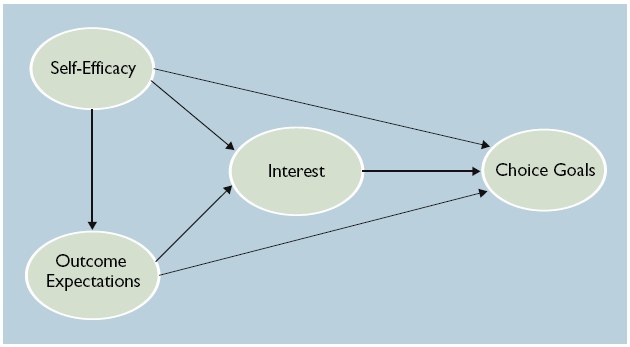TITLE: Some Thoughts on How to Increase CS Enrollments
AUTHOR: Eugene Wallingford
DATE: October 16, 2007 6:45 AM
DESC:
-----
BODY:
The latest issue of Communications of the ACM
(Volume 50, Number 10, pages 67-71) contains an article
by Asli Yagmur Akbulut and Clayton Arlen Looney called
Inspiring Students to Pursue Computing Degrees.
With that title, how could I not jump to it and read it
immediately?
Most of the paper describes a survey of the sort that
business professors love to do but which I find quite
dull. Still, both the ideas that motivate the survey
and the recommendations the authors make at the end are
worth thinking about.
First, Akbulut and Looney base their research on a
model derived from social cognitive theory called the
Major Choice Goals Model. In this model, a person's
choice goal (such as the choice to major in computing)
is influenced by her interest in the area, the rewards
she expects to receive as a result of the choice, and
her belief that she can succeed in the area, which is
termed self-efficacy. Interest itself is influenced
by expected rewards and self-efficacy, and expected
rewards are influenced by self-efficacy.
 Their survey of business majors in an introductory
business computing course found that choice goals were
determined primarily by interest, and that the the other
links in the model also correlated significantly. If
their findings generalize, then...
Their survey of business majors in an introductory
business computing course found that choice goals were
determined primarily by interest, and that the the other
links in the model also correlated significantly. If
their findings generalize, then...
- The key to increasing the number of computing majors
lies in increasing their interest in the discipline.
- Talking to students about the financial and other
rewards of majoring in computing influence their
choice to major in the discipline only indirectly,
through increased interest.
- Self-efficacy -- a student's judgment of her capability
to perform effectively in the majors -- strongly
affects both interest and outcome expectations.
I don't suppose that these results are all that earth-shaking,
but they do give us clues on where we might best focus our
efforts to recruit more majors.
First, we need to foster "a robust sense of self-efficacy"
in potential students. This is most effective when we work
with people who have little or no direct experience. We
should strive to help these folks have successful, positive
first experiences. When we encounter people who have had
bad past experiences with computing, we need to work extra
hard to overcome these with positive exposure.
Second, we need to enhance students' outcome expectations
in a broader set of outcomes than just the lure of high
salaries and plentiful jobs. Most of us have been looking
for opportunities to share salary and employment data with
students. But outcome expectations seem to affect a student's
choice of majoring in computing mostly through increased
interest in the discipline, and financial reward is only one,
rather narrow, avenue to interest. We should communicate
as many different kinds of rewards as possible, via as many
different routes as possible, including different kinds of
people who have reaped these benefits such as peer groups,
alumni, and various IT professionals.
Third, we can seek to increase interest more directly. Again,
this is something that most people in CS and IT have already
been doing. I think the value Akbulut and Looney add here
is in looking to the learning literature for influences on
interest. These include the effective use of "novelty,
complexity, conflict, and uncertainty". They remind us that
"As technologies continue to rapidly evolve, it is important
to deliver course content that is fresh, current, and
aligned with students' interests". Our students are looking
for ideas that they can apply to their own experiences and to
open problems in the world.
The authors also make a suggestion that is controversial with
many CS faculty but basic knowledge to others: In order to
build self-efficacy and interest in students, we need to be
sure that
... the most appropriate faculty are assigned to introductory
computing courses. Instructors who are personable, fair,
innovative, engaging, and can serve as role models would be
more likely to attract larger pools of students.
This isn't pandering; it is simply how the world works. As
someone who now has a role in assigning faculty to teach
courses, I know that this can be a difficult task, both in
making the choices and in working with faculty who would
prefer different assignments.
When I first dug into the paper, I had some reservations.
I'm not a big fan of this kind of research, because it seems
too contingent on too many external factors to be convincing
on its own. This particular study looked at business students
and a very soft sort of computing course (Introduction to
Information Systems) that all business students have to take
at many universities. Do the findings apply to CS students
more generally, or students who might be interested in a more
technical sense of computing? In the end, though, this paper
gave me a different spin on a couple of issues with which we
have been grappling, in particular on students' sense that
they can succeed in computing and on the indirect relationship
between expected rewards and choice of major. This perspective
gives me something useful to work with.
-----

